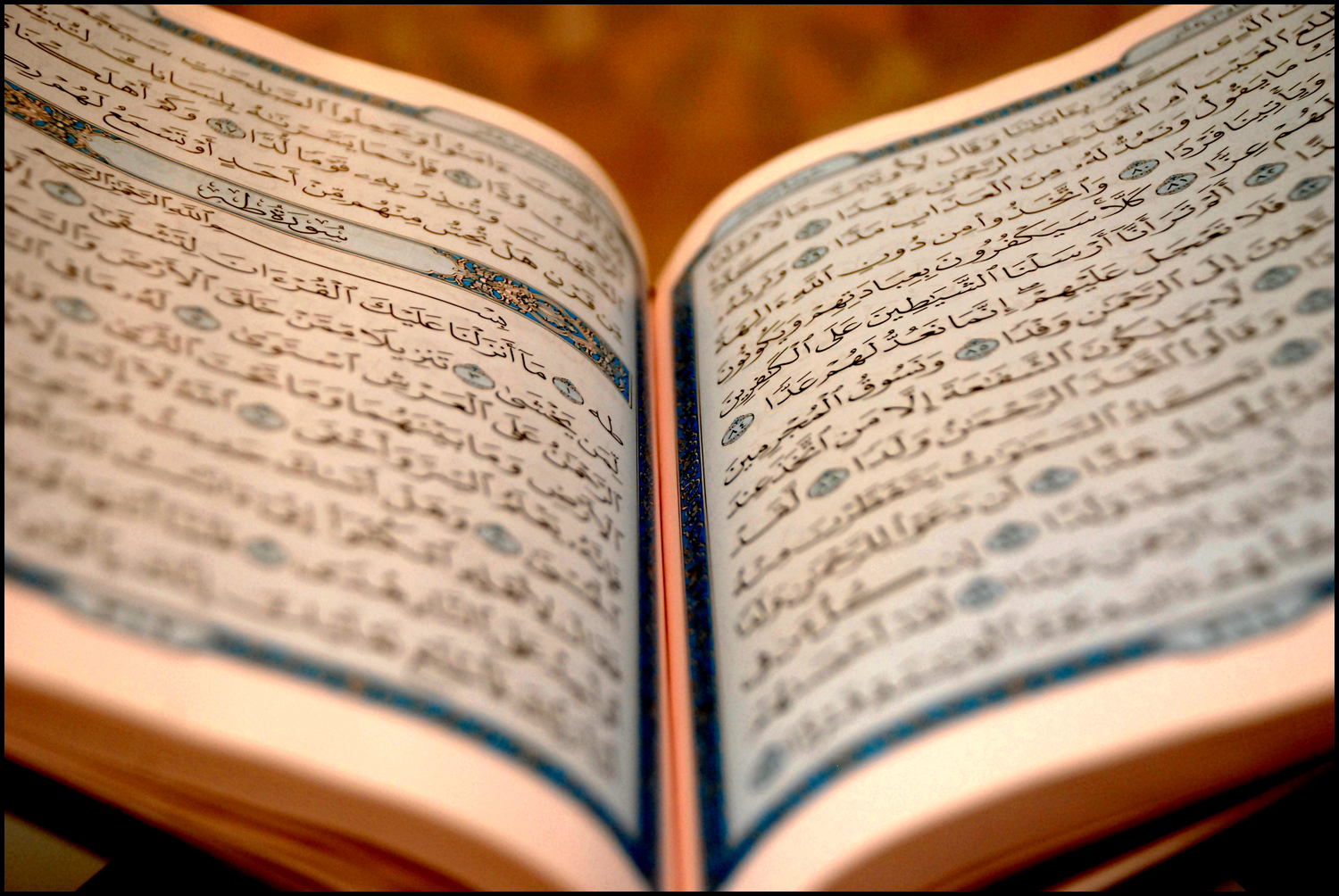And if anyone of the idolaters ask protection of thee, grant him protection so that he may hear the word of Allah; then convey him to his place of security. That is because they are a people who have no knowledge. (9:6)
Allegation
The allegation against verse 9:6 is that the best way of staying safe from Muslim violence at the time of Muhammad (sa) was to convert to Islam; prayer (salat) and the poor tax (zakat) are among the religion’s Five Pillars. It is also alleged that this verse challenges the popular claim that the Quran only inspires violence within the context of self-defense, since the Muslims to whom it was written were obviously not under attack. Had they been under attack, then there would have been no waiting period (earlier verses make it a duty for Muslims to fight in self-defense, even during the sacred months). The historical context is Mecca after the idolaters were subjugated by Muhammad (sa) and posed no threat. Once the Muslims had power, they violently evicted those unbelievers who would not convert.
Context
The defensive war Muslims fought with their opponents has a historical context which needs to be explained here. When Muhammad (sa) began proselytizing Islam and the concept of the absolute Unity of God in Mecca, he faced bitter persecution and opposition for thirteen years. The Islamic doctrine challenged idolatry of a multitude of Gods which was the prevalent culture in Mecca. Muhammad (sa) and the Muslims eventually sought migration and gained an invitation to Medina where Muhammad (sa) served as arbitrator to their feuding tribes. There was an open declaration of war by way of a letter that demanded the release of Muhammad (sa) to the Meccans. This led to the seizing of Muslim assets in Mecca and trading them for other goods which would have been used to fund the war against Islam. Muslims won the first battle but the idolaters kept up their efforts with subsequent battles raising a confederate army of an alliance against Muslims in order to destroy the movement.
The term الشھر الحرم is generally applied to the four sacred months of Shawwal, Dhu`l-Qa`da, Dhu`l-Hijja, and Rajab, the first three being the months of the Greater Pilgrimage, while in the last the Arabs generally performed the Lesser Pilgrimage or `Umra. In 9:5, however, the words الشھر الحرم signify not the “sacred months” but “forbidden months” and refer to the four months mentioned in 9:2. These were meant to grant a respite to those idolaters who had unduly opposed the Islamic movement to travel through the land in safety and see whether Islam had not triumphed and whether the word of God (prophecies) had not proved true. At the end of this period, during which all hostilities were to be suspended, war was to be resumed against the idolaters with the exception, of course, of such as had entered into a treaty with Muslims.
It should, however, be remembered that the command to wage war after the expiry of the four forbidden months did not apply to all idolaters without discrimination but was directed only against such avowed enemies of Islam as had themselves started hostilities against Islam and had broken their word and plotted to expel the Holy Prophet (sa) from the city. The reason for this ultimatum is given in 9:8-13. As for those idolaters who had not been guilty of faithlessness and treachery, they were to be protected (see verses 9:4 and 9:7). It is highly regrettable, however, that divorcing this commandment from its context, some critics have made 9:5 the basis for an attack against Islam, alleging that it inculcates the destruction of all non-Muslims. The Quran and history belie that baseless allegation.
In verse 9:5, the words, “But if they repent…”, show that even those enemies of Islam at whose hands Muslims had suffered grievous losses were to be forgiven if they repented and accepted Islam of their own free will. There are three possible scenarios that Islam allows for an individual to be forgiven: 1) retaliation or combat for the transgressions that he committed, 2) forgiveness and 3) if he, by his own will, chooses Islam, he is then in letter and spirit forgiven of his previous trespasses. The reason for the third injunction is simply because the whole struggle was for the purpose of establishing freedom of religion. Therefore, at the very moment someone chose Islam, they were forgiven of all past transgressions , this being a very common belief among all religions with the distinction that Islam implements it practically. Furthermore, that no compulsion was to be used is clear from the very next verse, as also from the fundamental injunction laid down in 2:257.
There were a large number of men among the idolaters who, in their heart of hearts, believed in the truth of Islam, but who, either through pride or for fear of others or for other reasons, refrained from making an open confession of faith. This verse was intended to convey to such people that, if any one of them declared his faith in Islam even during the war, his confession would not be taken as hypocritical or taken as a deceit to rescue himself from death.
A conclusive proof of the fact that there were many among idolaters who were at heart inclined to Islam but were afraid to declare their faith openly owing to fear of persecution is that whenever war ceased, there was a rush for conversion to Islam. The two years of peace that followed the Treaty of Hudaibiya brought over a very large number of converts to Islam. They could not have joined Islam in such large numbers, if they had not been believers in their hearts, having been held back only by fear of persecution. There are even cases on record of men accepting Islam in the thick of battle. There was one instance where a Muslim did not spare a man who accepted Islam in the middle of battle, thinking that he had done so merely to save his life. The Holy Prophet (sa), however, took this person severely to task, asking if he had torn open the heart of the person who accepted Islam and seen for himself that he had no sincerety in his heart. It is for this reason that the Quran directs Muslims not to harm such men from among the idolaters as profess their faith in Islam, even in the middle of a heated battle, for only God knows whether they are true Muslims or not.
The Divine attributes of “forgiving” and “merciful” at the end of the verse show that the conduct of idolaters had been such as to make them deserving of the severest of punishments, and that to extend forgiveness to them even on their abandonment of idolatry was really an act of mercy. Verse 9:6 clearly establishes the fact that war with idolaters was not undertaken to force them to embrace Islam, because, according to it, even when a state of war existed idolaters were to be permitted to come to the Muslim camp or the Muslim headquarters if they desired to investigate the truth. Then, after the truth had been preached to them and they had been acquainted with the teachings of Islam, they were to be safely conveyed to their place of security, if they did not feel inclined to embrace the new faith. In the face of such clear teachings, it is the height of injustice to accuse Islam of intolerance or of allowing compulsion for the propagation of its teachings.
In verse 9:7, the words, “So, as long as they stand true to you, stand true to them”, show that war was permissible only against such non-Muslims as were faithless to their covenants and attacked Muslims treacherously. As for the rest, Muslims have been bidden to observe their engagements strictly and faithfully with them. It will be noted that, like 9:4, this verse describes the observance of covenants and treaties as an act of piety and righteousness which is pleasing in the sight of God. The Qur`an repeatedly exhorts Muslims to be faithful to their treaties.

